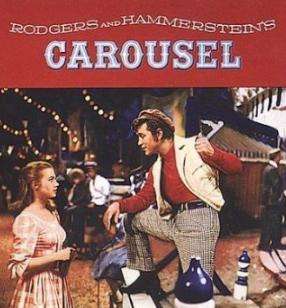Carousel

Walk on through the wind, walk on through the rain,
Though your dreams be tossed and blown.
Walk on, walk on, with hope in your heart,
And you'll never walk alone!
A 1945 musical adaptation of Ferenc Molnar's play Liliom, Carousel was Rodgers and Hammerstein's follow-up to their first smash, Oklahoma!!. A film version was released in 1956, a year after the film version of Oklahoma! (and reuniting the latter's two leads).
Billy Bigelow is a carousel barker at a New England village, while Julie Jordan is a mill worker from the same town. They meet, kind of fall in love and get married. The two lose their jobs, which frustrates Billy to the point that he lets loose his violent tendencies on Julie. Despite this, she's still willing to love the guy; when she gets pregnant, Billy decides to participate with a chum named Jigger in robbing Julie's former boss. The plan goes awry, and a disgraced Billy takes his own life. Fifteen years later, Billy is given a chance by "The Highest Judge of All" to redeem himself by helping his family out.
A remake of the movie has been planned, with Hugh Jackman as the lead role of Billy.
- Alliterative Name: Billy Biggelow and Julie Jordan.
- All Musicals Are Adaptations
- Beta Couple: Carrie Pipperidge and Enoch Snow
- Break the Cutie: Well, the Fates attempted to break Julie, anyway. Find the love of your life, marry him, get caught in an abusive relationship, and then he dies, leaving you to raise your unborn child alone. Lesser characters would've definitely cracked under that strain.
- Dark Reprise: "If I loved you." First sung by the leads as they ponder a life together; Billy sings it as a ghost as he mourns his wasting his opportunity to spit out his feelings for Julie.
- Disappeared Dad: Billy for Louise, though there is an explanation for this, and the audience gets to know what happened from Billy's point of view.
- Domestic Abuser
- Does Not Like Shoes: Louise, Billy Bigelow's daughter
- Driven to Suicide: Billy. The film version amends this to Billy accidentally falling on his own knife.
- Fair for Its Day: The topic of domestic abuse was not handled very well in this play, but the fact that it even admitted this happened was a small breakthrough.
- Ghost Song: Anything Billy sings after his death, especially his reprise of "If I Loved You."
- Hair of Gold: Billy and Julie's daughter Louise.
- How We Got Here: The film version opens with Billy at the pearly gates; the stage version starts chronologically.
- Irrelevant Act Opener: "A real nice clambake."
- Jerkass Facade: Billy Bigelow
- Karma Houdini: Jigger. Though the film version suggests he eventually went to hell.
- Mood Whiplash: The bench scene is a beautiful love song where the couple falls for each other. In the next scene, they're already having some serious marital problems.
- Musicalis Interruptus: Julie tries singing "You'll never walk alone," but breaks down crying after a few bars. Nettie and the other townfolks take over.
- Never Got to Say Goodbye
- Opening Ballet: The Carousel Waltz.
- The Other Marty: Frank Sinatra was cast as Billy Bigelow in the film version, but left production a few weeks in rather than shoot each scene twice (once on 35mm, another on 55mm). A few weeks after Gordon Macrae came on board, they discovered a conversion process between the formats.
- Posthumous Narration: Billy tells the story of his life with Julie while in heaven.
- Revised Ending: Liliom originally ended on a downer with Liliom failing to help his daughter and going to hell once he strikes her. This was revised in Carousel so that Billy sticks around afterwards and succeeds in his mission. Molnar actually liked the newer ending.
- The 1934 film version of Liliom also ended with a happy ending, with Liliom ending up in heaven, because of Julie's love and faithfulness for him. Basically a version of the infamous quote, "It's possible for someone to hit you, and not hurt at all," got Liliom into heaven! That, and Julie keeping the star.
- Someone to Remember Him By: Julie and Billy's daughter, Louise, is born after his death.
- The Soprano: Julie Jordan
- Talk About the Weather
- You Are Not Alone: You'll never walk alone.